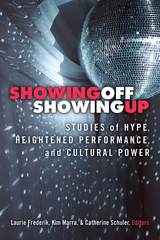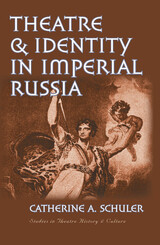2 books about Schuler, Catherine A.

Showing Off, Showing Up
Studies of Hype, Heightened Performance, and Cultural Power
Laurie Frederik, Kim Marra, and Catherine Schuler, Editors
University of Michigan Press, 2017
The interdisciplinary essays in Showing Off, Showing Up examine acts of showing, a particular species of performance that relies on competition and judgment, active spectatorship, embodied excess, and exposure of core values and hidden truths. Acts of showing highlight those dimensions of performance that can most manipulate spectators and consumers, often through over-the-top heightening and skewing of presentation. Many forms of showing and of heightened performance, however, operate more enigmatically and covertly while still profoundly affecting the social world, even if our reactions to them are initially flippant or unconcerned because “it’s just a show.” Examining a wide range of examples—from dog shows to competitive dancing to carnivals to striptease, the essays illuminate how such events variously foster competition, exaggerate a characteristic, and reveal hidden truths. There is as much to be learned about the power of showing through subtlety and underlying intentionality as through overt display. The book’s theoretical introduction and 12 essays by leading scholars reveal how diverse, particularly efficacious genres of showing are theoretically connected and why they merit more concerted attention, especially in the 21st century.
[more]

Theatre and Identity in Imperial Russia
Catherine A. Schuler
University of Iowa Press, 2009
What role did the theatre—both institutionally and literally—play in Russia’s modernization? How did the comparatively harmonious relationship that developed among the state, the nobility, and the theatre in the eighteenth century transform into ideological warfare between the state and the intelligentsia in the nineteenth? How were the identities of the Russian people and the Russian soul configured and altered by actors in St. Petersburg and Moscow? Using the dramatic events of nineteenth-century Russian history as a backdrop, Catherine Schuler answers these questions by revealing the intricate links among national modernization, identity, and theatre.
Schuler draws upon contemporary journals written and published by the educated nobility and the intelligentsia—who represented the intellectual, aesthetic, and cultural groups of the day—as well as upon the laws of the Russian empire and upon theatrical memoirs. With fascinating detail, she spotlights the ideologically charged binaries ascribed to prominent actors—authentic/performed, primitive/civilized, Russian/Western—that mirrored the volatility of national identity from the Napoleonic Wars through the reign of Alexander II.
If the path traveled by Russian artists and audiences from the turn of the nineteenth century to the era of the Great Reforms reveals anything about Russian culture and society, it may be that there is nothing more difficult than being Russian in Russia. By exploring the ways in which theatrical administrators, playwrights, and actors responded to three tsars, two wars, and a major revolt, this carefully crafted book demonstrates the battle for the hearts and minds of the Russian people.
Schuler draws upon contemporary journals written and published by the educated nobility and the intelligentsia—who represented the intellectual, aesthetic, and cultural groups of the day—as well as upon the laws of the Russian empire and upon theatrical memoirs. With fascinating detail, she spotlights the ideologically charged binaries ascribed to prominent actors—authentic/performed, primitive/civilized, Russian/Western—that mirrored the volatility of national identity from the Napoleonic Wars through the reign of Alexander II.
If the path traveled by Russian artists and audiences from the turn of the nineteenth century to the era of the Great Reforms reveals anything about Russian culture and society, it may be that there is nothing more difficult than being Russian in Russia. By exploring the ways in which theatrical administrators, playwrights, and actors responded to three tsars, two wars, and a major revolt, this carefully crafted book demonstrates the battle for the hearts and minds of the Russian people.
[more]
READERS
Browse our collection.
PUBLISHERS
See BiblioVault's publisher services.
STUDENT SERVICES
Files for college accessibility offices.
UChicago Accessibility Resources
home | accessibility | search | about | contact us
BiblioVault ® 2001 - 2024
The University of Chicago Press









